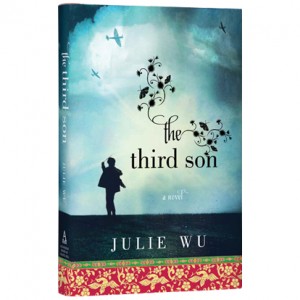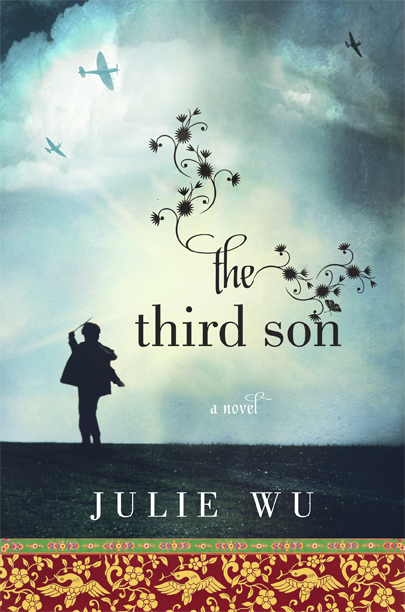Jaime Boler: Julie, thank you for allowing me to ask you these questions. The Third Son utterly captivated me from the first page and transported me to 1940s Taiwan. Once I started reading your story, I couldn’t stop! I know readers are going to love The Third Son just as much as I do.
Julie Wu: It makes me so happy to hear that—thank you, and thanks for having me!
JB: You are a physician. How did you get into writing?
JW: The writing actually came first. I always loved fiction, and actually my undergraduate degree was in Literature. I started writing soon after college, when I was in graduate school, studying opera at Indiana University. I realized then that writing would be my ultimate occupation, but I also realized that my sheltered life experience limited my writing. I wanted to see and experience all I could of life, and meet all kinds of people.
I’d previously been thinking of pursuing medicine, and I thought that a medical career would not only be personally rewarding but would also enrich my point of view as a writer. So instead of MFA programs, I applied to medical schools.
JB: I did some searching and saw where The Third Son is your father’s story or loosely based on his experience growing up. Can you explain?
JW: I would describe The Third Son as “inspired by” my father’s story. The emotional journey is very close to his, but the actual scenes and events of the story, large and small, are essentially fictional.
JB: I also discovered you began working on this novel in 2001. What has the journey been like?
JW: Long. A learning experience. Torture. A joy. I have learned a lot about myself, about writing, about the writing industry, and about Facebook.
JB: Your first agent suggested you write The Third Son as a memoir. Why did you want to tell your story in novel form?
JW: I enjoy the immersive, emotional aspect of fiction. Writing a non-fiction book was not going to give me that, especially since my father does not recall a lot of sensory detail or actual dialogue. And I did not want to write a story about myself and my relationship with my father because I have had a pretty good, privileged life and a pretty good relationship with my parents. How boring is that?
JB: How many revisions did the story undergo? And how different was it then compared to the final, printed book? Was all the revising and rewriting worth it?
JW: I lost track of the number of revisions. I didn’t even print them all out, but I have drawers, trunks, and filing cabinets filled with drafts. Someday I’ll have a big bonfire.
The book is about 98% different from the first draft. The first draft, I’d say, was a somewhat tentative family chronicle. At some point I committed wholeheartedly to fiction, and the finished book is a real, dimensional, and hopefully satisfying novel. I think it’s the best book I could have written, so yes, it was worth it.
JB: How does it feel to finally see it in print?
JW: Awesome! I’ll admit I didn’t jump up and down hyperventilating when I first saw my galley, but I do hold it and flip through it a lot. I think seeing the hardcover with all the blurbs on it, in bookstores, will be very exciting.
JB: All the early reviews about The Third Son are positive; some are positively glowing. How do you feel about the wonderful early praise your book is getting?
 JW: It feels great. One of the reasons I wrote the book was to shed light on the modern political history of Taiwan, which is so little known in the West. The more successful my book is, the more people will be learning a bit more about Taiwan and the Taiwanese people, which is wonderful.
JW: It feels great. One of the reasons I wrote the book was to shed light on the modern political history of Taiwan, which is so little known in the West. The more successful my book is, the more people will be learning a bit more about Taiwan and the Taiwanese people, which is wonderful.
JB: What kind of research did you do for your story?
JW: I interviewed my parents extensively. For the Taiwan sections, I read as many books and articles as I could find on Taiwan before, during, and after that period. I was able to use the internet to find photographs. I had traveled to Taiwan in 1990 with the intention of writing a (different) book set in Taiwan, so I also had extensive notes from that time.
For the sections in America, I consulted books and magazines from and on the fifties and sixties, watched some old movies, and read a lot about the International Geophysical Year. I also visited MIT’s Haystack Observatory to speak with a slightly puzzled atmospheric scientist.
JB: When you were writing the story, did you have any sense how big it could be?
JW: I knew the story had the potential to be big. My job was to realize that potential.
JB: My favorite characters in the story are Saburo and Toru. Do you have a favorite?
JW: Oh, that’s like choosing among your children. I really do love them all. One of the things I’ve learned over the course of revising this book is that even your minor characters must have richness and purpose. I’ll say I’m particularly fond of my mathematician-gardener, Professor Chen, in part because he did not exist until my latest revisions and now he’s not only kind of fabulous, but also a core part of the book.
JB: Your story is so emotional, especially when Saburo is mistreated and/or abused. Yet, this is based on your own father. Did you ever get emotional while writing it, so choked up to had to stop and leave it for a while?
JW: Interestingly, I did not. I really thought of Saburo as his own character. While writing I was imagining what this person Saburo would feel, think, and do.
JB: What do your parents think of the novel?
JW: It’s difficult for them to read it with any objectivity, of course. They are on some level disappointed that the novel isn’t their true story. At the same time they recognize that the story I’ve written is much more page turning and appealing to the general reader than one that would have stuck to the facts. And my father still finds reading the book to be a very emotional experience.
JB: What do you like to do when you aren’t writing?
JW: Gosh, lots of things. I like to sing, read, garden, snuggle with the kids. When the kids are older I’d like to get back to painting and playing the violin.
JB: If you could have dinner with any author, living or dead, who would you choose and why?
JW: Tolstoy. I’d love to pick his brain. I’d also love to tell him how many former Taiwanese political prisoners I’ve spoken to have listed him as one of their favorite authors.
JB: What book is on your nightstand right now?
JW: My nightstand is covered in piles of books—novels, biographies, writing craft books, children’s books, and parenting books. I can’t even see the clock anymore.
JB: If you could describe yourself in one word, what would it be?
JW: Keen.
JB: Are you going on an author tour? If so, which cities will you visit?
JW: Yes. I’m still waiting to hear where I’m going.
 JB: What do you hope readers take with them after reading The Third Son?
JB: What do you hope readers take with them after reading The Third Son?
JW: I’m hoping readers will feel moved and empowered. I’m also hoping they’ll have learned a bit about Taiwan and the Taiwanese people.
JB: Are you working on anything new?
JW: I am working on a book inspired by the former political prisoners I interviewed in Taiwan this past October. It will cover the same approximate time period as The Third Son, but will be about people more directly involved in the February 28 Incident, the subsequent massacres, and the White Terror. The book will take place partly on Green Island, a wind-swept volcanic island off Taiwan’s coast, where political prisoners—mostly apolitical university students—were kept for years, forced to build their own prison and grow their own food. In the early years the prisoners interacted with the island’s poor inhabitants, teaching them in schools and in the fields, and providing medical care. These people were, and are, amazing.
JB: This story, so grim, is full of hope. I felt as if I were reading a Jamie Ford or Janice Y.K. Lee novel and not a debut novel. You are so amazingly talented, and I thank you for agreeing to chat with me about The Third Son. Good luck with the book, Julie!
JW: Thanks so much, Jaime! This interview was a pleasure.





Pingback: thebookishowl.com » Blog Archive » Book Notes – Julie Wu “The Third Son”
Pingback: It’s May–What Should I Read? | Bookmagnet's Blog
Pingback: Vision and Reinvention: Julie Wu’s The Third Son | Bloom